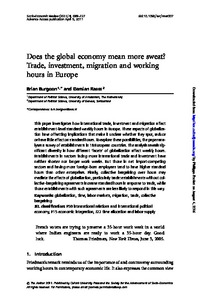Does the global economy mean more sweat? Trade, investment, migration and working hours in Europe

Burgoon, Brian ; Raess, Damian
2011
9
4
Oct.
699-727
collective bargaining ; comparison ; investment ; labour market ; migration ; trade ; working time
Working time and leave
English
Bibliogr.
"This paper investigates how international trade, investment and migration affect establishment-level standard weekly hours in Europe. These aspects of globalization have offsetting implications that make it unclear whether they spur, reduce or have little effect on standard hours. To explore these possibilities, the paper analyses a survey of establishments in 18 European countries. The analysis reveals significant diversity in how different ‘facets' of globalization affect weekly hours. Establishments in sectors facing more international trade and investment have neither shorter nor longer work weeks. But those in net import-competing sectors and having more foreign-born employees tend to have higher standard hours than other enterprises. Finally, collective bargaining over hours may mediate the effects of globalization, particularly trade: establishments without collective-bargaining agreements increase standard hours in response to trade, while those establishments with such agreements are less likely to respond in this way."
Digital
The ETUI is co-funded by the European Union. Views and opinions expressed are however those of the author(s) only and do not necessarily reflect those of the European Union or the ETUI.